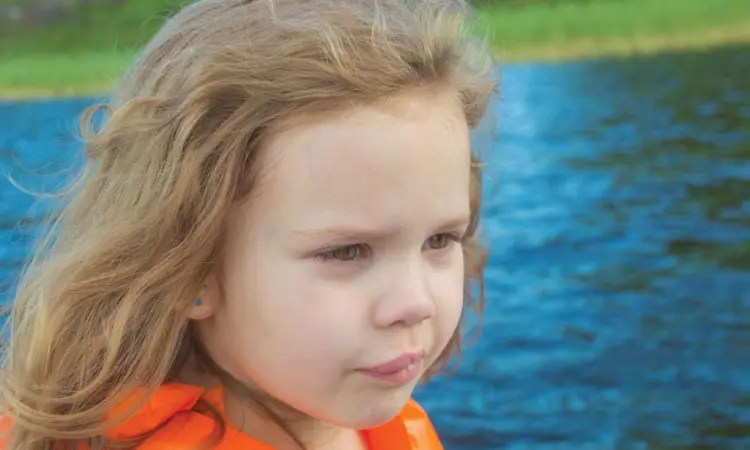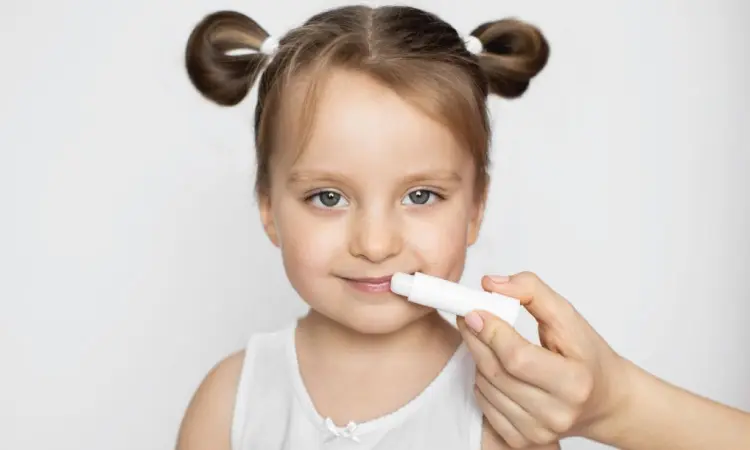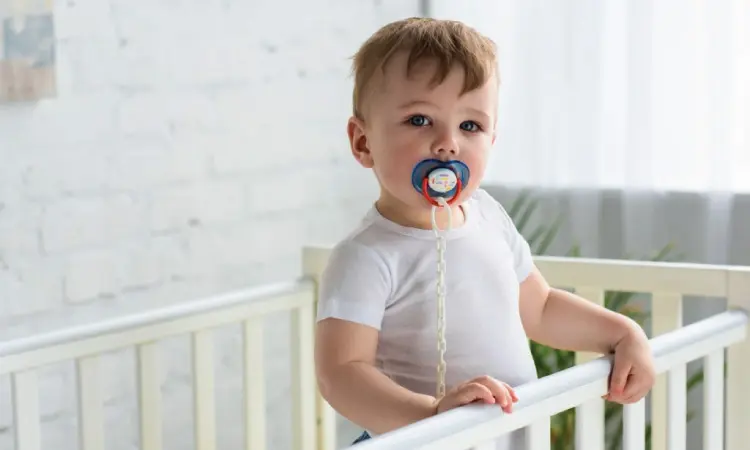Bad habits like nail-biting, hair pulling, or thumb sucking are not uncommon when it comes to toddlers. Biting the lower lip is another common bad habit among toddler. Just like breaking any other bad habit, it is pretty hard to stop the child from biting lower lip.
Though difficult to break, it is not impossible to get a child not to bite his lips. Lip-biting can bring forth some complications too.. This habit can be broken by understanding why the child developed this habit and following certain steps patiently.
Why Do Toddlers Bite Their Lips?
There are many reasons why a child starts biting their lip. It is most often an unconscious decision to do this. Many studies show that not only lip-biting but also cheek biting is an unconscious psychogenic habit. It can be caused by various emotions or needs, including but not limited to a need for attention or even too much stress.
Given below are just a few of the possible reasons why your child might be doing this.
1. Stress or overstimulation
A change in their surroundings can be very difficult for a young child, especially if the change is sudden. They may be over-stimulated or stressed. In such a time, biting their lip becomes a way to ground them. It may help them concentrate as they slowly learn to adapt.
If this becomes a habit during this time, it will continue even after the situation has gone back to normal.
2. It is a way of self-soothing
Babies are often naturally capable of soothing themselves. They have many methods for this. A famous one is sucking their thumb, which is usually a habit learnt in the womb. Biting lips in sleep is also another way of self-soothing
After they are born, however, it becomes harder to reach their thumbs. So, they suck or bite on something they can reach easily, which, in this case, is their bottom lip. This can evolve into a regular habit later on.
A baby may feel the need to soothe themselves in this way in many situations, like when they are sleepy, in an unfamiliar situation, in company with strangers, or even if left all by themselves. In many ways, a baby biting their lip is similar to them sucking on a pacifier.
It may be difficult to see or identify lip biting in this case, as they usually do it when you are not around. However, there are still signs you can identify. This includes rashes around their lip or small wounds.
Related Reading: 12 Social Skills Activities For Toddlers
If you notice these signs, you should start paying more attention to find out whether they are biting their lip. Unfortunately, there is not much you can do to prevent this entirely before it begins, as it is an instinct that is naturally instilled in the child since before birth.
3. Chapped lips

If your baby has had a history of having chapped lips, they may think they still have to bite, suck or lick their lips, even if the lips are completely healthy now. If their lips are still chapped, and the skin on the lip is uneven, they may bite their lips to pull out the uneven skin and make it even.
It hurts them but the cause-and-effect clause is unknown to them.
4. Severe malocclusion
A severe misalignment of the teeth can increase the chance of your child biting their lip. So, if your little one has an overbite or any such protrusion of the upper teeth, they may intentionally or unintentionally bite their lips.
5. Imitating adults
Do you or anyone else close to the child have the habit of biting their lips?
Children are great observers, and they have a habit of picking up on even the most subtle quirks of those around them. So, if you or any other close relative of the child bites their lip, your child will pick up on it and copy the behaviour.
Related Reading: The Top 10 Most Common Parenting Mistakes
Potential Oral Problems For Children Who Bite Their Lips
A child who is having the habit of biting lower lip can contract many potential oral issues. Biting lower lips may not cause any serious issues for your baby if it goes on only for a couple of months. However, it may have negative effects on their development if it continues for over a year.
- Makes the lip dry and chap: Excessive lip biting can adversely affect the lips’ health and appearance. The skin on the lips is thinner than the rest of the child’s body. Biting lower lips can damage the skin of the lips. It could make the lips dry, cracked and chapped. Depending upon this habit’s duration and intensity, the risk of baby bruised bottom lip, tissue trauma, nerve, and facial issues increases
- Increase the risk of skin infection: Biting the lower lip increases the risk of a skin infection around the lower lip. The child may develop a red ring around this area. The child with the habit of biting lower lip is prone to develop swollen lips, cold sores, or impetigo
- Can cause dental distortions: The habit of biting the lower jaw can cause dental distortions such as occlusion or asymmetric jaw. As children get older, the lip-biting habit increases the risk of developing an overbite (an overbite where the upper jaw and teeth overlap the lower jaw and teeth beyond normal)
- Difficulty to chew: Lip biting can cause misalignment in your child’s teeth. If they develop a severe overbite, the lower teeth can cause damage to the upper gums. It can also cause your baby to develop an asymmetric jaw. All of this, combined with the misalignment, can make it incredibly difficult for the child to chew properly
- Speech issues: Long-term lip biting has several negative effects on your baby’s development, up to and including their speech. Yes, if your child bites their lip too much, it can be difficult for them to learn to talk later on, and when they do start talking, they could have some speech impediments. If this happens, they may need intense speech therapy to correct it
Usually, lip biting is normal, and the child may grow out of the habit on their own. But keep in mind that doing it for a long time, or at a comparatively higher age, can negatively impact your baby. In that case, it is important to stop the child from biting lower lip.
So, if your child is over a year old and has a habit of biting their lips often, you should consult a doctor and discuss ways to prevent it.
7 Ways To Stop A Child From Biting Lower Lip
As mentioned above, this is usually a habit that the child will grow out of on their own. However, that is hardly a comfort for a worried parent if the habit causes physical harm to the baby. So, if you notice that this habit is hurting your baby, you have to take some action to stop the child from biting lower lip.
Not all preventive measures will work for all babies, but they are all worth a try. You never know which one will work. So, here are a few things you can do to protect your baby’s lips and mouth.
1. Apply lip balm for chapped lips

Rather than drawing attention to this habit, you can try this subtler way to dissuade them. Apply some nice safe balm, or even special cream, over the lips and affected area. You can do this around twice a day. This might help to stop the child from biting lower lip.
This will stop the lips from getting chapped and will also soothe the baby. So, they will no longer feel the need to bite their lips.
Another product you can use for this is Vitamin E oil. Applying to their lips every night will prevent chapped and dry lips, keeping them soft and smooth.
2. Divert attention
It is wrong to assume that children do not get stressed. Being a toddler is hard work, coping with being small and having no idea what the fuss is about can drive a child mad.
Since stress is one of the main reasons babies develop this habit, you can stop their lip-biting by reducing stress. Divert their attention towards other activities. Offer them love and support, try to see the world as they are.
3. Apply bitter juice
This is a pretty smart and witty trick. If your child has a habit of frequently biting their lips, you can do this. Take some bitter edible juice, such as the juice of bitter gourd, and apply it lightly on their lip. The next time they try to bite their lip, they will be in for a surprise!
Try this a few times until they get the message that biting their lip will result in a bitter taste. Then they will stop, even when there is no bitter juice on their lip. This is the most tried and worked trick to stop the child from biting lower lip.
4. Substitute another comfort behaviour

Biting the lower lip is often a comfort behaviour. Notice if a child bites her lips when she wakes up in the middle of the night when no one is around. Or perhaps when you leave for work.
It often is the direct result of being uncomfortable or unhappy. For example, if they had the pacifier taken from them too early, they might resort to lip biting instead.
Related Reading: 8 Disadvantages Of Teethers For Babies
So introducing another comfort behaviour, preferably something you can remove later, like a pacifier, may satisfy the baby and stop the child from biting lower lip.
5. Talk with the toddler
Shouting at the child or punishing them will definitely not stop the child from biting their lip. In fact, it can be very damaging to the psyche of such a young child.
So instead, if the child is big enough to talk, calmly talk to them. Explain in simple terms how biting the lip can have bad consequences. Make them understand that biting their lip is a bad habit that they will regret later on.
6. Say No
Did you know that many babies start understanding what the word “no” means as early as six months? So, if you notice your baby biting their lip, simply tell him no, and then distract them with something else. Sooner or later, they will understand that you are referring to their lip biting. This might help to stop the child from biting lower lip eventually.
7. Reward and praise

It is important – not only for this but for any goal – that your baby is properly motivated. So, go for the positive reinforcement method! Whenever they successfully avoid biting their lip, praise them and reward their good behaviour. This will motivate them to keep up the good job!
Thus, it is not that hard to break the habit of biting the lower lip. Just find this tendency on time and take the necessary steps to stop it. However, patience is the mantra when it comes to breaking any of his habits as well as teaching your children something new.


1 comment
My 2 years bite lawer lips only while she is sleepy or she knows now sleeping time.